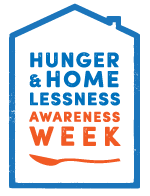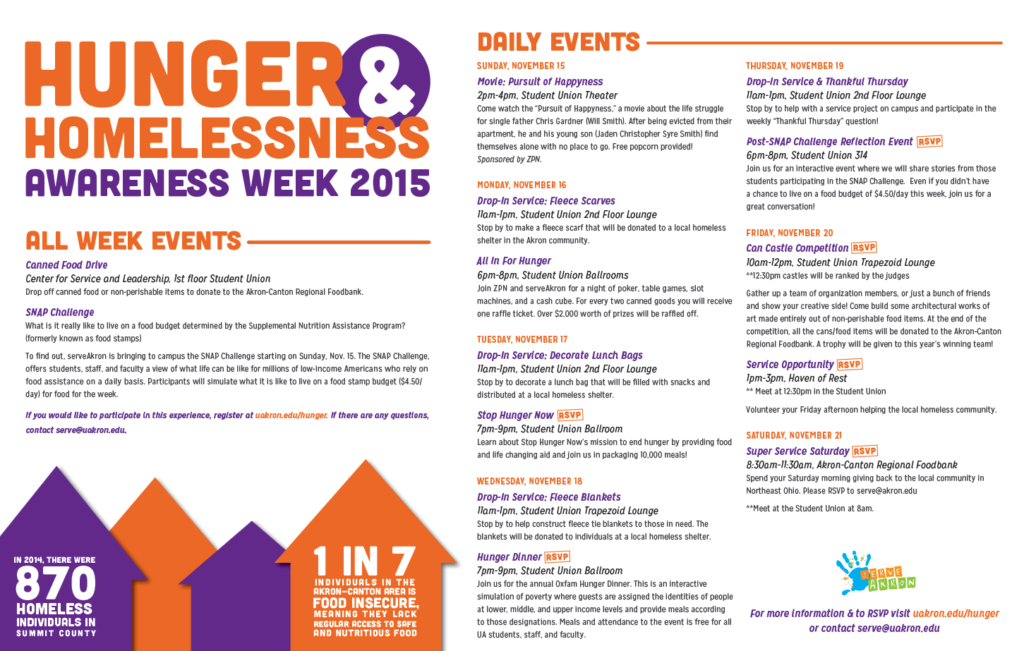A Few of this Year’s College Highlights
December 4, 2016
We've just wrapped up this year's amazing Hunger and Homelessness Awareness Week. We're still sifting through all of the great stories about this year's events. Here we wanted to share just a few of the best events organized on college campuses.
College of Charleston
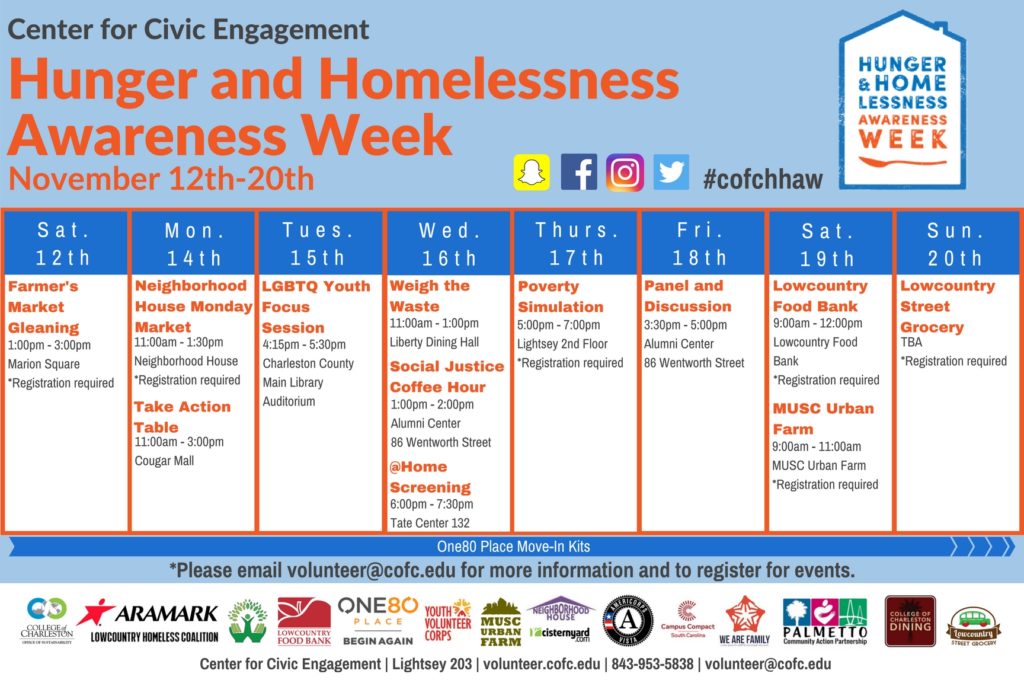
Villanova University
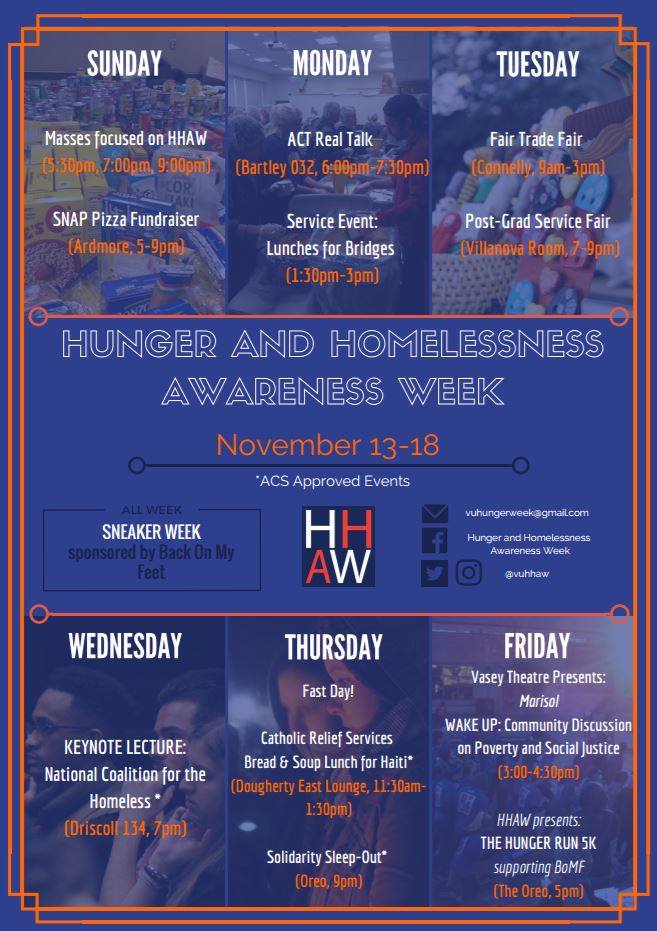
University of Central Florida
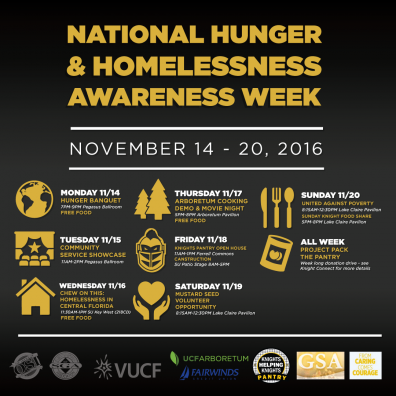
Spotlight: Towson University
November 17, 2016
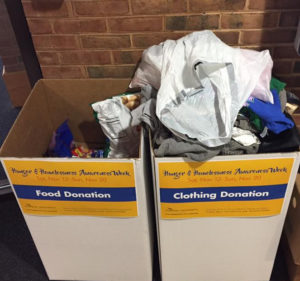 At Towson University, the Office of Civic Engagement and Leadership organizes Hunger and Homelessness Awareness Week.
At Towson University, the Office of Civic Engagement and Leadership organizes Hunger and Homelessness Awareness Week.
Their latest Awareness Week features a mixture of community service opportunities and awareness-raising events. For their biggest service event, students joined with Clay Pots, a local community center, to clean up and beautify a neighborhood in southwest Baltimore. During the week, volunteers also assembled personal care kits for people experiencing homelessness and made PB&J sandwiches for a local food bank.
To raise awareness and educate the public, the Office of Civic Engagement and Leadership held a panel discussion on local homelessness and a movie screening. They also organized a week-long food and clothing drive to support local food banks and shelters.
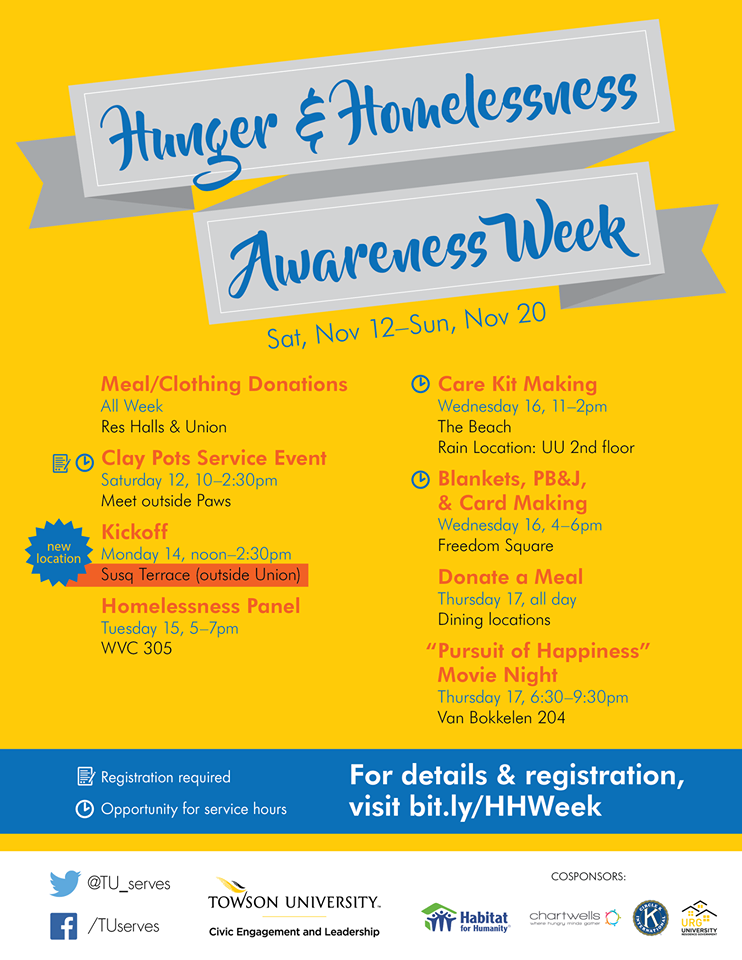
Resource: Sample Press Release
November 11, 2016
The mainstream media can be a powerful tool to educate the public and rally their support. You should invite your local media outlets to cover your Hunger and Homelessness Awareness Week events. Here's how:
- Make a list of the media outlets in your community. Include local newspapers, TV stations, radio stations, and blogs.
- Identify the appropriate contact person at each outlet and find out their email address and phone number. For newspapers, you want the metro editor; for TV and radio stations, you want the news editor.
- Write a press release for your Awareness Week. You can use the sample below as a template.
- At the beginning of the week, email your press release to the contact person at each media outlet.
- Call each media outlet to make sure they received the press release and encourage them to cover your events.
Here's a sample press release for you to use:
FOR IMMEDIATE RELEASE
Monday, November 14, 2016
CONTACT:
NAME, ORGANIZATION
PHONE, EMAIL
YOUR COMMUNITY Takes Stand against Hunger and Homelessness
Local Group Kicks Off Hunger and Homelessness Awareness Week
Today, YOUR ORGANIZATION kicked off Hunger and Homelessness Awareness Week, an annual week of action where local volunteers come together to draw attention to poverty in YOUR COMMUNITY. Participants will spend the week holding educational, community service, fundraising, and advocacy events to address these critical issues.
“This is the time of year when we all reflect on our lives, finding gratitude and peace in where and who we are,” said SPOKESPERSON from YOUR GROUP. “But there are so many families that will not be able to come together during the season, torn apart by hunger and homelessness.”
Hunger and Homelessness Awareness Week is co-sponsored nationally by the National Coalition for the Homeless and the National Student Campaign Against Hunger and Homelessness. The event originated at Villanova University in 1975, and now takes place in nearly 700 communities across the country.
“Hunger and homelessness are epidemics that sadly affect too many members of our community,” said SPOKESPERSON. “Hunger and Homelessness Awareness Week is an opportunity for us to tackle these issues head on, rally public support, and call for solutions.”
The events planned for the week include:
- PROVIDE A DESCRIPTION FOR EACH EVENT IN YOUR WEEK
- MAKE SURE TO INCLUDE DATE, TIME, AND LOCATION
For information about Hunger and Homelessness Awareness Week, visit http://hhweek.org.
# # #
ADD DESCRIPTION OF YOUR ORGANIZATION
Event Idea: Us and Them
November 6, 2016
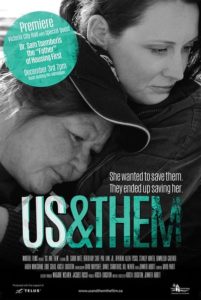 If you are seeking a movie to screen during Hunger and Homelessness Awareness Week, consider showing "Us and Them," a new documentary on homelessness.
If you are seeking a movie to screen during Hunger and Homelessness Awareness Week, consider showing "Us and Them," a new documentary on homelessness.
For this film, filmmaker Krista Loughton spent ten years documenting the lives of four chronically homeless individuals. These four charismatic people reveal the heartrending realities of their lives. The severe challenges of life on the street are portrayed with an unapologetic openness, in both emotive and humorous ways. All are struggling with addiction issues rooted in their painful childhood histories. Their stories help to break down the stereotypes about homelessness, changing the way that filmgoers view the homeless.
In describing the film, Dr. Sam Tsemberis, founder and director of the Pathways Housing First Institute, said: "Labeling our fellow human beings as 'homeless' creates separation and allows for conflict. Hearing the remarkable stories of struggle and survival of the people in this film brings us closer to them and eliminates the distance between us."
To learn more about the film and contact the filmmaker about holding a screening, visit the film's website.
Ending the Criminalization of Homelessness
November 5, 2016
Each year, we choose to highlight one poverty-related advocacy issue during Hunger and Homelessness Awareness Week. This year, we are focusing on the criminalization of homelessness.
Across the country, cities are criminalizing homelessness by making it illegal for people to sit, sleep, and even eat in public places – despite the absence of available housing, shelter, and other basic resources. These laws and policies violate the constitutional rights of the homeless and burden them with arrest records, fines, and fees, all of which stand in the way of homeless peoples' ability to get jobs or housing.
These laws do not work to end homelessness. The evidence is clear that homelessness is reduced in communities that focus on housing, rather than on criminalization. In addition, the criminalization of homelessness costs more money than simply solving the problem by ensuring access to adequate housing.
During your Hunger and Homelessness Awareness Week, one way to incorporate this issue is by holding a sleepout. The National Coalition for the Homeless estimates that there are more than 564,000 people experiencing homelessness in the United States on a typical night, but there are only 426,000 shelter beds available - this leaves 25% of homeless people with no shelter. As a result, encampments (also known as “tent cities”) have been popping up on sidewalks and in city parks. Instead of providing more shelter space or affordable housing, many cities have responded by outlawing these tent cities. A sleepout is a great way to draw attention to these issues.
Another way you can address criminalization is by looking up the local food sharing laws in your community and speaking out against any policies that punish the homeless. Just like tent cities, sharing food in a public space with people experiencing homelessness has become illegal in many locations. Cities have ostensibly passed these laws out of concern over health code violations, but in truth they are primarily acting to quiet public complaints about homeless people in their neighborhoods. Either way the end result is to leave many homeless people without access to safe food.
If the criminalization of homelessness is of concern to you and is taking place in your community, please consider speaking out during your Awareness Week about the many ways that this course of action is counterproductive to ending homelessness.
Learn more about this issue here.
Event Idea: Hold a Sleepout
November 3, 2016
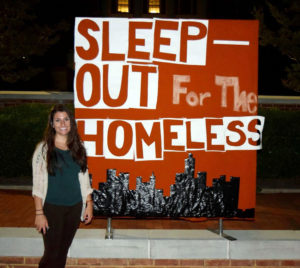 The "One Night Without a Home" sleepout is a popular piece of many Hunger and Homelessness Awareness Weeks.
The "One Night Without a Home" sleepout is a popular piece of many Hunger and Homelessness Awareness Weeks.
At this event, volunteers spend a night outside - typically for 12 hours, from 7 p.m. to 7 a.m. - to raise awareness about the problem of homelessness. You can choose to have your volunteers sleep outside in sleeping bags, carboard boxes, or tents. While most of the night will be spent sleeping, you should fill the first couple hours of the event with speakers, discussions, or activities to educate the participants about homelessness.
Although one night outside can in no way equate with real homelessness, this activity can raise awareness among both participants and the campus community. Make sure to hold your sleepout in a busy location where people passing by will see the event and learn about it.
A variation on this concept is the “Living in a Car” sleepout, where volunteers take turns spending 12-hour shifts living in a car in a public location to simulate how some homeless people are forced to live.
Spotlight: College of Charleston
October 1, 2016
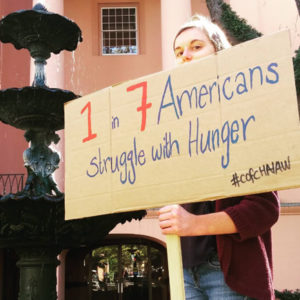 At the College of Charleston, the Center for Civic Engagement organizes Hunger and Homelessness Awareness Week.
At the College of Charleston, the Center for Civic Engagement organizes Hunger and Homelessness Awareness Week.
This past year, the priority for their Awareness Week was to provide students with opportunities to take action through a series of service events at the local farmers market, the campus dining halls, and the regional food bank. Students also organized a campus-wide clothing drive to benefit a local homeless shelter.
In order to educate students about the issues, they also held a series of documentary movie screenings on campus. After each screening, students hosted a discussion to encourage critical reflection about the film. In addition, the Center for Civic Engagement partnered with the college’s Office of Sustainability to host a Social Justice Coffee Hour revolving around hunger and homelessness.
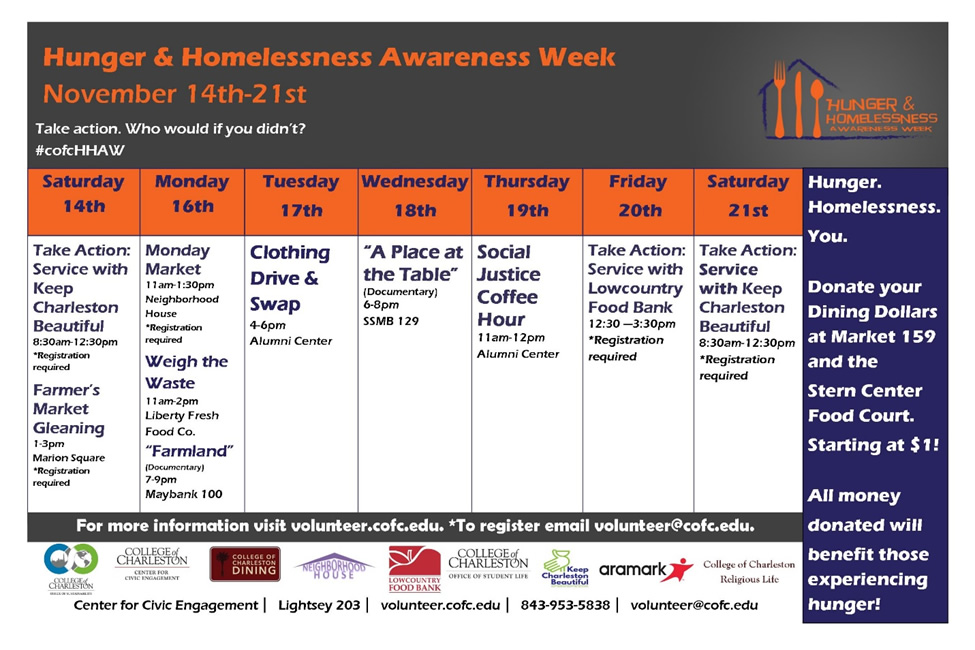
Spotlight: The University of Akron
August 19, 2016
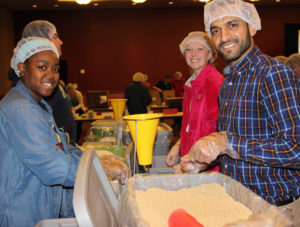 At the University of Akron, the Department of Student Life’s serveAkron program organizes Hunger and Homelessness Awareness Week.
At the University of Akron, the Department of Student Life’s serveAkron program organizes Hunger and Homelessness Awareness Week.
The anchor of their Awareness Week last year was a week-long food drive for their regional food bank. In addition, they offered a busy schedule of educational events and service projects including a movie screening, service trips to the local homeless shelter and regional food bank, a meal packaging event, and a casino night designed to teach players about poverty.
A group of students, staff, and faculty members also spent the week taking the SNAP Challenge, by trying to live on the same daily budget as a food stamp recipient.
In total, more than 400 students participated in the week’s events.
Event Idea: Hold an Empty Bowls Fundraiser
August 19, 2016
 The Empty Bowls fundraiser is a longstanding staple of many Hunger and Homelessness Awareness Weeks. The first Empty Bowls event was held 26 years ago, and since then the event has spread to locations across the world.
The Empty Bowls fundraiser is a longstanding staple of many Hunger and Homelessness Awareness Weeks. The first Empty Bowls event was held 26 years ago, and since then the event has spread to locations across the world.
An Empty Bowls event serves both to raise awareness about poverty and raise money for a local charity. The first step is to find a local arts center or business that will let you use their workspace and their kiln. Once you have a location, enlist a group of volunteers to make and paint their own ceramic bowls. Encourage them to get creative - each bowl should feel original.
The next step is to organize a dinner event to showcase the bowls. Attendees will be asked to make a donation and in exchange they will be fed a simple meal of soup and bread out of one of the handmade bowls. Each attendee gets to take their bowl home as a reminder of the experience. You should also invite a guest speaker to talk to the group and lead a discussion during the dinner about hunger and homelessness in the community.
For more information on the history of Empty Bowls, visit www.emptybowls.net.
